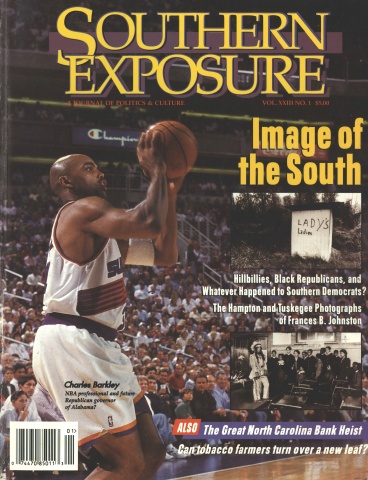Women in Politics

This article originally appeared in Southern Exposure Vol. 23 No. 1, "Image of the South." Find more from that issue here.
Although women have wielded political influence in the South for centuries, they still are not as successful as their sisters elsewhere in breaking through the glass ceilings of Southern legislatures. “Part of it is lack of experience in playing politics in the South,” says Natalie Davis, a political scientist at Birmingham Southern College in Alabama. “Women are not on boards of directors nor have they penetrated the business community.”
From colonial times, Women have found creative ways to express their political wishes. In Edenton, North Carolina, 51 women staged their own version of the Boston Tea Party in 1774, signing a set of resolutions to boycott British goods until “acts which tend to enslave this our Native country should be repealed.”
In the 19th century, the antislavery work of Southern women such as Angelina and Sarah Grimke, Ida Wells-Barnett and Jessie Daniel Ames paved the way for the battle . . . the battle for their own freedom to vote. But only four Southern states adopted women’s suffrage before the Constitutional amendment in 1920 made it national law.
While many of the first women in office replaced their deceased husbands, it wasn’t until in the 1960s and ’70s that more women became involved in electoral politics. Fannie Lou Hamer, the daughter of sharecroppers, helped form the Mississippi Freedom Democratic Party in 1964, providing representatives to the Democratic National Convention as an alternative to the all-white delegation. Barbara Jordan of Texas and Marilyn Lloyd of Tennessee were early Congresswomen.
But getting into office has been and continues to be harder for Southern women than for women in other parts of the country. In 1975, there were three Southern women in the U.S. House of Representatives and none in the Senate. In 1995, just one of the eight women in the Senate is Southern, and 11 of the 48 women in the House.
Southern state legislatures are also poorly represented by women, according to figures from the Center for the American Woman and Politics in New Brunswick, New Jersey. In 1975, there were just 90 women in all Southern state legislatures, four percent of all members. In 1995, the number has increased to 14 percent, with 278 women elected among 2,054 legislators. Florida does best in the South with 31 woman lawmakers. Alabama ranks worst nationwide with only six women in its 140-member legislature.
“The first year I was in there it was rough. A lot of them were really ugly,” says Ann Bedsole, a veteran of the Alabama legislature. “One of them said, ‘we just didn’t want any women in here.’ After that they treated me like one of them.” After serving four years in the Alabama House and 12 in the Senate, Bedsole ran for governor in 1994. She made it through the primary but lost in the Republican run-off.
While Bedsole attributes her defeat mainly to her late entrance in the race and her strong position on education reform, she says being a woman was also a factor. “It was a shock to me that I couldn’t raise money. Where men would give me $100, they would give someone else [a man] $1,000.” Bedsole adds that her male opponent used her gender against her in the campaign. He echoed the view of the religious right that “God didn’t want a woman running things.”
Bedsole and other Alabama women created a political action committee (PAC) called the Alabama Solution in an effort to encourage women to enter political races and help them raise money. Over the two years of its existence, the PAC has raised $140,000 from 400 contributors and supported 30 woman candidates.
“We’ve made a lot of headway,” says Cameron Vowell, an Alabama Solution board member. “Men have to run three times to be elected. So we tell women if they give money to a woman who runs for the legislature, and she loses, it’s not a wasted investment — if she signs up again.”
While it’s a slow process getting women in the legislature, Vowell is not discouraged. “I know that with more women there, the performance of the legislature will improve.” she says.
Tags
Mary Lee Kerr
Mary Lee Kerr is a freelance writer and editor who lives in Chapel Hill, NC. (2000)
Mary Lee Kerr writes “Still the South” from Carrboro, North Carolina. (1999)